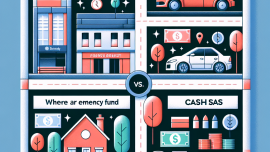
Should You Pause Investing to Pay Off Your Mortgage Early?
How to Build Wealth on an Average Salary: Smart Money Moves That Work
Let’s get one thing straight: You don’t need a six-figure income to build wealth. Nope. You just need a six-figure mindset. Hi, I’m Rachel Simmons, your financially savvy (and slightly sarcastic) BFF who believes in lazy girl investing, budget wine, and ruthless financial independence. If you’ve been wondering how to stretch your average paycheck into something meaningful—something powerful—then darling, you’re in exactly the right place.
First, Define What “Wealth” Means to You
Some people want yachts. Some just want to sleep without debt-induced heart palpitations. Before you start stacking that paper, decide what wealth looks like to you. Is it:
- Paying off your student loans and actually owning your degree?
- Traveling whenever you want, without maxing out a credit card?
- Buying a home (or not!)—whatever floats your financially independent boat?
Once you’re clear on your endgame, you can reverse-engineer your way there. It’s like Google Maps but with cash flow instead of cars.
The Truth About Earning vs. Keeping
You don’t need more money. You need to be smarter with the money you already have. Yep, I said it. According to a 2023 survey by Bankrate, over 60% of Americans making over $100K still live paycheck to paycheck. The problem isn’t always income—it’s how we treat it.
So, what’s the plan?
Let’s break this down with real, actionable steps. Because fluffy financial advice is like eating air for dinner: totally unsatisfying.
1. Budget Like a CEO, Not a College Student
Start treating your personal finances like a business. Every dollar should have a defined role—your money’s lazy until you give it a job.
Try the Zero-Based Budgeting method. It works like this:
- List your total monthly income after taxes.
- List your expenses—including savings, investing, and fun money.
- Make your income minus expenses equal zero. Every dollar is accounted for.
I love using apps like YNAB (You Need a Budget) and Mint if you’re digitally inclined. Or go old-school with a spreadsheet. Either way, own it.
2. Automate Like a Boss
Remember that plant you forgot to water? Don’t do that with your savings. Set up automatic transfers so saving and investing happen whether you’re feeling responsible or not.
- Direct deposit a percentage of your paycheck into a high-yield savings account.
- Set up recurring transfers to your Roth IRA or brokerage account.
Out of sight, out of temptation. Because if I can’t see it, I can’t spend it on overpriced iced lattes, right?
3. Boost Your Emergency Fund: It’s Not Just for Emergencies
If your car breaks down, your dog needs surgery, or your landlord suddenly channels Satan, you’ll need a cash buffer. Aim for at least 3-6 months of living expenses in a high-yield savings account. I like these accounts for their low fees and actual interest (unlike your traditional bank giving you $0.02 a year).
An emergency fund isn’t just financial—it’s emotional insurance. Peace of mind, baby. Priceless.
4. Attack Debt Strategically
If debt is dragging you down like emotional baggage from your first relationship, it’s time to cut it loose. But smartly.
Use One of These Two Debt Strategies:
- Debt Avalanche: Pay off debts with the highest interest first. Mathematically optimal, and great if you love spreadsheets.
- Debt Snowball: Pay off the smallest debt first, then roll that payment into the next one. Great for momentum and motivation.
No shame zone here—debt happens. But you can 100% get out of it, even on a modest income, if you stay consistent and focused.
5. Invest, Even If You Think You “Can’t Afford It”
I’ll fight you on this one. You literally cannot afford not to invest. Compound interest is the closest thing we’ve got to legal magic, and your average salary will go from humble to heroic with enough time in the market.
Where to Start With Investing:
- 401(k): Especially if you get employer matching—hello, free money!
- Roth IRA: Tax-free growth = future you throwing confetti.
- Index funds: Low-cost, diversified, and blessfully passive.
If you’re overwhelmed, start with just $50 a month. It adds up. Remember: building wealth is about habits, not heroics.
6. Increase Your Income Without Selling Your Soul
Okay, we talked about managing your money. But let’s be honest: earning a little extra doesn’t hurt.
Consider these side hustles or upskilling options that don’t require you to give up all your free time:
- Freelance work based on your existing skills
- Remote customer support gigs
- Online tutoring in subjects you already know
- Learning high-value skills like SEO, UX writing, or coding through free programs like Coursera
And remember: promotions and job changes are the biggest wealth accelerators. Ask for raises. Change companies every few years if it makes sense. Be loyal to your bank account first.
7. Choose a Life That Costs Less (Without Feeling Like Punishment)
Want to know a secret? Most of the happy, wealthy people I know simply chose cheaper lives—not cheaper in quality, but in expectations.
Here’s what that looks like:
- Drive a reliable used car, not a shiny new ego booster
- Cook at home 80% of the time but still brunch occasionally (this isn’t prison)
- Live in a smaller apartment now so you can buy a home later
It’s not deprivation if you’re consciously choosing your spending based on what you actually care about.
The Bottom Line: Average Salary ≠ Average Life
If no one’s told you this before, let me be the first: Building wealth is completely possible on an average salary. The key is consistency, intentionality, and using your money like a VIP guest list—only smart, useful dollars get invited to the party.
Stay curious. Keep learning. And don’t let Instagram trick you into thinking you’re behind. You’re in charge of your money now—and the future you is already clapping. Loudly.
Have questions or want to share your progress? Drop me a message, and let’s keep this money conversation going.









Leave a Reply